Alan Keith Tillotson, Ph.D., A.H.G., D.Ay.
See book keywords and concepts |
 One cannot imagine TCM without ginseng root and astragalus root, TAM without ashwagandha root and guggul gum, or Western herbalism without echinacea and dandelion root. These are among the herbs I will discuss. I have chosen more than 80 herbs that Nai-shing and I consider to be among the most useful available to us in effectively treating the common diseases we see every day. About a dozen or so less commonly used herbs have also been included.
How do you know which herbs are best? One cannot imagine TCM without ginseng root and astragalus root, TAM without ashwagandha root and guggul gum, or Western herbalism without echinacea and dandelion root. These are among the herbs I will discuss. I have chosen more than 80 herbs that Nai-shing and I consider to be among the most useful available to us in effectively treating the common diseases we see every day. About a dozen or so less commonly used herbs have also been included.
How do you know which herbs are best? |
| Herbalist Robyn Klein, AHG, instructor at the Sweetgrass School of herbalism, has been vigilant in exposing the strategies used by dishonest critics, and she sent me the following synopsis of her investigations. By the way, Robyn publishes Robyn's Recommended Reading, which is a great way to keep up on the best literature in the field of herbal medicine. See the Resource Guide for a comprehensive list of Robyn's suggestions.
Following are some examples of the less-than-truthful tactics that have been used by critics of herbal medicine. |
| The language of herbalism is constantly in a stage of evolution from its humble roots. Rather than discarding the teachings of the past and replacing them with modern science, herbalists are continuously balancing and reconstructing the wisdom of their elders through their own experiences. These observations take on new power when science looks at them and adds its perspectives to the echoes from the past. Those who ignore the teachings of the past do so at the peril of their own health. |
| This sort of language is the basis of herbalism. Chapter 6 will provide you with a brief overview and a glossary of herbal terms to help you understand the language of herbal medicine. These are terms you will encounter throughout this book and the rest of your journey through the world of herbal medicine. To me, it is a human language, not a scientific one. It does not require double-blind studies for people to grasp its basic meanings.
Centuries of observations have led to general agreement that herbs nourish, warm, cool, reduce pain, detoxify, stimulate, sedate, and so forth. |
Ralph W. Moss PhD
See book keywords and concepts |
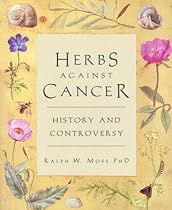 Many other writers believe that there is a religious component to herbalism, and that a beneficent Deity put herbs in a locale in order to cure the human illnesses found there. It simply a matter of matching up the symptoms with the cure. This approach is epitomized by a bestselling book, God's Pharmacy, which appeared originally in Germany. Other writers have put forward fanciful ideas of direct or subtle communication between plants and humans.
I enjoy reading such theories. Many other writers believe that there is a religious component to herbalism, and that a beneficent Deity put herbs in a locale in order to cure the human illnesses found there. It simply a matter of matching up the symptoms with the cure. This approach is epitomized by a bestselling book, God's Pharmacy, which appeared originally in Germany. Other writers have put forward fanciful ideas of direct or subtle communication between plants and humans.
I enjoy reading such theories. |
| However, fundamentally, I am trying interpret herbalism through the prism of science, not religion. For that reason, in this book you will find no explanations of herbs based on any mystical concepts (251). My motto is the same as the one often heard at the US National Institutes of Health: "In God we trust. All others show data."
By using the tools of the appropriate sciences, I believe we can arrive at valuable knowledge about plants and how they can be used to fight malignant diseases. |
Robert S. McCaleb, Evelyn Leigh, and Krista Morien
See book keywords and concepts |
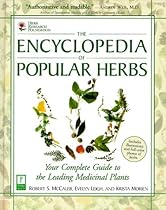 Recommended Periodicals
General
The Business of Herbs 439 PonderosaWay Jemez Springs, NM 8702S-802S
The Canadian Journal of herbalism 11 Winthrop Place
Stoney Creek, Ontario, Canada L8G 3M3
The Herb Companion Interweave Press, Inc. 201 East 4th Street Loveland, CO 80537 Phone: (970) 669-7672; (800) 272-2193
The Herb Quarterly Long Mountain Press PO Box 548
Boiling Springs, PA 17007 Phone: (717) 245-2764
Herbs for Health Interweave Press, Inc. Recommended Periodicals
General
The Business of Herbs 439 PonderosaWay Jemez Springs, NM 8702S-802S
The Canadian Journal of herbalism 11 Winthrop Place
Stoney Creek, Ontario, Canada L8G 3M3
The Herb Companion Interweave Press, Inc. 201 East 4th Street Loveland, CO 80537 Phone: (970) 669-7672; (800) 272-2193
The Herb Quarterly Long Mountain Press PO Box 548
Boiling Springs, PA 17007 Phone: (717) 245-2764
Herbs for Health Interweave Press, Inc. |
Gary Null, Ph.D.
See book keywords and concepts |
 Journal of Med. herbalism, 3(4), 1991, p.
64-73.
¦ DWARF/SAW PALMETTO
Benign Prostatic Hyperplasia
This review article cites numerous studies supporting the use of saw palmetto berries and stinging nettle roots in the treatment of benign postatic hyperplasia.
—E. Koch & A. Biber, "Pharmacological Effects of Sabal and Urtica Extracts as Basis for a Rational Medication of Benign Prostatic Hyperplasia," Urologe, 34(2), 1994, p. 90-95.
This study examined the effects of a 160 mg dose of Serona repens extract taken twice a day over 3 months by 505 benign prostatic hyperplasia patients. Journal of Med. herbalism, 3(4), 1991, p.
64-73.
¦ DWARF/SAW PALMETTO
Benign Prostatic Hyperplasia
This review article cites numerous studies supporting the use of saw palmetto berries and stinging nettle roots in the treatment of benign postatic hyperplasia.
—E. Koch & A. Biber, "Pharmacological Effects of Sabal and Urtica Extracts as Basis for a Rational Medication of Benign Prostatic Hyperplasia," Urologe, 34(2), 1994, p. 90-95.
This study examined the effects of a 160 mg dose of Serona repens extract taken twice a day over 3 months by 505 benign prostatic hyperplasia patients. |
Michael T. Murray, N.D.
See book keywords and concepts |
 It is worth remembering that although the scientific investigation of plant medicines is taking away some of the mystery and romance of herbalism as a greater understanding of the ways in which herbs work is achieved, herbal medicine is being improved by modern scientific research and technology.
Improvements in plant cultivation techniques and the quality of herbal extracts (quality control and standardization) have led to the development of some very effective plant medicines. It is worth remembering that although the scientific investigation of plant medicines is taking away some of the mystery and romance of herbalism as a greater understanding of the ways in which herbs work is achieved, herbal medicine is being improved by modern scientific research and technology.
Improvements in plant cultivation techniques and the quality of herbal extracts (quality control and standardization) have led to the development of some very effective plant medicines. |
Gary Null, Ph.D.
See book keywords and concepts |
 Frances, "Cimicifuga for Depression," Medical herbalism, 7(1-2), Spring/Summer
1995, p. 1-2.
Measles
Cimicifuga-Pueraria decoction has been shown to effective in the early stages of measles. When used according to traditional Chinese Methods, additional studies have found it to be effective in influenza, mumps, measles complicated with pneumonia, congenital syphilis and tonsilitis as well.
—H.M. Chang & P.P. But (eds.), Pharmacology and Applications of Chinese Materia Medica,
Hong Kong, World Scientific, 1986, p. 235-239. Frances, "Cimicifuga for Depression," Medical herbalism, 7(1-2), Spring/Summer
1995, p. 1-2.
Measles
Cimicifuga-Pueraria decoction has been shown to effective in the early stages of measles. When used according to traditional Chinese Methods, additional studies have found it to be effective in influenza, mumps, measles complicated with pneumonia, congenital syphilis and tonsilitis as well.
—H.M. Chang & P.P. But (eds.), Pharmacology and Applications of Chinese Materia Medica,
Hong Kong, World Scientific, 1986, p. 235-239. |
the Editors of PREVENTION
See book keywords and concepts |
 Home herbalism 101
Xxerbal remedies have been around for a few thousand years or so, but it's never been easier to use them at home than it is right now.
Unlike your ancestors, you don't have to go traipsing through the woods for elusive flora or surrender your soul to some mysterious shaman. You don't have to change your religion, your politics, or your clothes. All you have to do is get to know some friendly medicinal herbs and make the decision to get involved with your own well-being.
"It's really just a question of taking control of your health again," says David Field, N.D. Home herbalism 101
Xxerbal remedies have been around for a few thousand years or so, but it's never been easier to use them at home than it is right now.
Unlike your ancestors, you don't have to go traipsing through the woods for elusive flora or surrender your soul to some mysterious shaman. You don't have to change your religion, your politics, or your clothes. All you have to do is get to know some friendly medicinal herbs and make the decision to get involved with your own well-being.
"It's really just a question of taking control of your health again," says David Field, N.D. |
| Qramp ^ark Qream
Although you can take it internally, cramp hark makes a wonderful topical cream to soothe aching muscles, says Keith Robertson, a member of Britain's National Institute of Medical Herbalists and director of education for the Scottish School of Medical herbalism in Glasgow.
Try this basic recipe to make your own personal brand of relaxation. Rub a small amount of cream directly on achy muscles andjoints up to three times a day. Unlike an ointment, cream blends with the skin and allows it to breathe. It's safe to use this until symptoms subside. |
| Adventures in herbalism horehound for hacking
.Because of her asthma, Tierney Salter had been plagued by a chronic cough since birth. She never made it through an 8-hour snooze without having to endure at least one bout of coughing. By the time she was 18, she had seen specialists all over her state and had a medicine cabinet brimming with prescription-strength asthma cough medicines. Nothing worked.
When she was a freshman at the University of California at Santa Barbara, one of her roommates suggested that she try some white horehound for her cough. |
| Broadhurst says, as are
Adventures in herbalism a Stomach for Herbs
JLegend has it that the first-ever printed compilation of herbal remedies was the Pen-T'sao, said to have been assembled by Shen Nung, the Red Emperor of China, somewhere around 2800 b.c. That would date it about 1,300 years before the Egyptians began using herbs such as myrrh and castor oil.
In truth, the Pen-T'sao may be based on oral traditions that go back that far, but the written version has probably been around only since 200 b.c. or so. It's old, but Egyptian and African herbals are considerably older. |
| It takes months to really be effective," says Chanchal Cabrera, a member of Britain's National Institute of Medical Herbalists, a professional member of the American Herbalists Guild,
Adventures in herbalism a Methodist's Medicine iWany of the medicinal herbs that we now take for granted we first learned about from Native Americans. Indeed, Europeans who arrived on these shores were often impressed with the natural healing skills of the native tribes. One of these was the English minister John Wesley, founder of Methodism, who spent some time early in his career as a missionary in Georgia. |
Robert S. McCaleb, Evelyn Leigh, and Krista Morien
See book keywords and concepts |
 Medical herbalism http: / / www.medherb. com The electronic version of Paul Bergner's newsletter of the same name. Also includes a discussion board, bookstore, adverse events reporting site, and many other features.
Michael Moore's Home Page http: / / www.rt66. com/hrbmoore/ HOMEPAGE/
Features an excellent collection of medicinal plant images. Site is managed by the director of the Southwest School of Botanical Medicine.
National Institutes of Health Dietary Supplement Database http:/ / www.nal.usda.gov/ fhic/IBIDS Produced by NIH's Office of Dietary Supplements in conjunction with the U.S. Medical herbalism http: / / www.medherb. com The electronic version of Paul Bergner's newsletter of the same name. Also includes a discussion board, bookstore, adverse events reporting site, and many other features.
Michael Moore's Home Page http: / / www.rt66. com/hrbmoore/ HOMEPAGE/
Features an excellent collection of medicinal plant images. Site is managed by the director of the Southwest School of Botanical Medicine.
National Institutes of Health Dietary Supplement Database http:/ / www.nal.usda.gov/ fhic/IBIDS Produced by NIH's Office of Dietary Supplements in conjunction with the U.S. |
Christopher Hobbs
See book keywords and concepts |
 As discussed below, western herbalism traditionally considered digestive stimulants strengthening to the entire bodily constitution. Cold and bitter herbs such as gentian and golden seal stimulate the production of digestive enzymes and if used chronically over several months, especially when combined with warming herbs such as ginger, can help strengthen the immune system, improve energy levels, and facilitate the healing process in people who are recovering from long-term chronic ailments (Maiwald, 1987). As discussed below, western herbalism traditionally considered digestive stimulants strengthening to the entire bodily constitution. Cold and bitter herbs such as gentian and golden seal stimulate the production of digestive enzymes and if used chronically over several months, especially when combined with warming herbs such as ginger, can help strengthen the immune system, improve energy levels, and facilitate the healing process in people who are recovering from long-term chronic ailments (Maiwald, 1987). |
Linda B. White, M.D.
See book keywords and concepts |
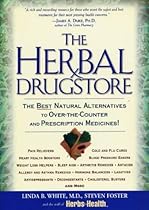 This designation means that the herbalist has studied at the National Institute for Medical herbalism in England, where clinical herbalists are nationally registered (the "M"stands for "member"; the "F" stands for "fellow"). A few practitioners in the United States have completed this course of study. black cohosh and red clover for their beneficial phytoestrogens, compounds capable of evening out the hormonal fluctuations that often precede menopause. This designation means that the herbalist has studied at the National Institute for Medical herbalism in England, where clinical herbalists are nationally registered (the "M"stands for "member"; the "F" stands for "fellow"). A few practitioners in the United States have completed this course of study. black cohosh and red clover for their beneficial phytoestrogens, compounds capable of evening out the hormonal fluctuations that often precede menopause. |
Rudolph M. Ballentine, M.D.
See book keywords and concepts |
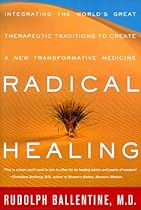 European herbalism may be physiologic in its current emphasis, but its earlier knowledge of plants was grounded in pre-Christian earth religions.23 Even Ayurveda, codified as a system of medical treatment, has roots in the ritual use of herbs described in the Atharveda24 millennia ago.
It is probable that people have always tended to see the actions of plants as physical and medical in a restricted sense on the one hand and, on the other, have stretched to reach for the more encompassing spiritual significance of what the plant might offer. European herbalism may be physiologic in its current emphasis, but its earlier knowledge of plants was grounded in pre-Christian earth religions.23 Even Ayurveda, codified as a system of medical treatment, has roots in the ritual use of herbs described in the Atharveda24 millennia ago.
It is probable that people have always tended to see the actions of plants as physical and medical in a restricted sense on the one hand and, on the other, have stretched to reach for the more encompassing spiritual significance of what the plant might offer. |
Mark Bricklin
See book keywords and concepts |
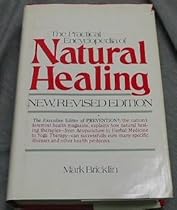 You can't—or shouldn't—approach herbalism with the idea that there's one herb for every symptom and expect to get very favorable results."
Kelp is not usually regarded as an herb, but to Dr. Zofchak, kelp is an herb from the sea. "Kelp contains organic iodine and trace elements such as gold, silver and many others which act as catalysts, sparking vital enzyme reactions. Specifically, kelp increases thyroid metabolism and can help some people to reduce excess weight."
What about the old-fashioned mustard plaster? Does it really work, and what is it good for? You can't—or shouldn't—approach herbalism with the idea that there's one herb for every symptom and expect to get very favorable results."
Kelp is not usually regarded as an herb, but to Dr. Zofchak, kelp is an herb from the sea. "Kelp contains organic iodine and trace elements such as gold, silver and many others which act as catalysts, sparking vital enzyme reactions. Specifically, kelp increases thyroid metabolism and can help some people to reduce excess weight."
What about the old-fashioned mustard plaster? Does it really work, and what is it good for? |
Lesley Tierra
See book keywords and concepts |
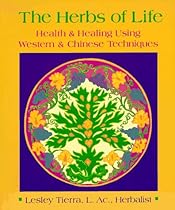 Through this process, it is hoped that the reader will feel empowered to further continue to explore on his or her own the beautiful world of herbalism.
Introduction
I felt invulnerable to disease as a teenager and in my early twenties. I experienced illness, like a cold or flu, as a normal life experience from which I quickly healed. However, in my mid-twenties I began experiencing problems which medical tests couldn't discover or define. I was one of those "doomed" to have recurring bouts of illness with no known cure. Through this process, it is hoped that the reader will feel empowered to further continue to explore on his or her own the beautiful world of herbalism.
Introduction
I felt invulnerable to disease as a teenager and in my early twenties. I experienced illness, like a cold or flu, as a normal life experience from which I quickly healed. However, in my mid-twenties I began experiencing problems which medical tests couldn't discover or define. I was one of those "doomed" to have recurring bouts of illness with no known cure. |
| This differentiation is part of the art of herbalism.
The herbs included here are commonly used in Western and Chinese herbology. They represent a range of cool to warm energies and a variety of properties. Effective in treating several conditions, these herbs are basically mild and safe for general use. They are well known in Western usage and are easily obtained. In fact, many can probably be found along the roads or in vacant lots near your own home, if not in your own back yard.
Many of the herbs may seem to have broad indications for use. |
| To begin with, the Western medical model, which is often imitated by inexperienced herbal practitioners in a kind of "allopathic" herbalism, focuses almost exclusively on relieving the primary symptom of the patient. The traditional wholistic herbalist treats not only the primary symptom, but the underlying causes which precipitate it. The Herbs of Life takes this second approach—recommending herbs and other foods which tend to strengthen underlying deficiencies as well as clear the body of toxic wastes. |
| Box 201660W, Austin, TX 78720, 1-512-331-8868
American Herbalists Guild
Box 1683, Soquel, CA 95073 A professional body of herbalists dedicated to promoting and maintaining criteria for professional practice of herbalism in America.
American Herbal Products Association
P.O. Box 2410, Austin, TX, 512-320-8555 Devoted to herbal products, their manufacturing and quality.
Herb Research Foundation, 1007 Pearl St., Suite 200F, Boulder, CO 80302
American Herbalists Association
P.O. Box 1673, Nevada City, CA 95959
Rocky Mountain Herbalists Coalition
412 Boulder St. |
| Box 1683, Santa Cruz, CA 95073
International Herb Growers and Marketers Association
Box 77123, Baton Rouge, CA 70879
Herbal Computer Programs
Falcor: Herbal Software A New Era in herbalism by Steve Blake, N.D., D.Sc.
5831 Highway 9, Felton, CA 95018
All of the following programs are available for IBM and Mac computers:
Globalherb: The world's largest reference library for the computer, this program contains information from all of die other following programs and more. Over 700 herbs, formulas and other therapies at your fingertips! |
Francisco, M.D. Contreras
See book keywords and concepts |
| Paul dedicated its cover to acupuncture, herbalism, therapeutic massage, macrobiotic diet, chiropractic and others in an article entitled "New Ways of Healing" in which it was reported that even orthodox hospitals were allowing the admission of alternative services, not because they believe in them but to recuperate lost clientele. The issue that broke all sales records for Time magazine appeared on April 6, 1995. The cover displayed a variety of vitamin tablets and capsules and bore the title "The Power of Vitamins. |
Mark Bricklin
See book keywords and concepts |
 Long recognized by traditional herbalism as a harmless sedative, camomile was tested by Lawrence Gould, M.D., and colleagues, who reported their findings in the Journal of Clinical Pharmacology in 1974. Actually, the purpose of their test was to see if camomile tea had any ill effects on cardiac patients who had undergone ventricular catheterization as part of their treatment. The tests showed that drinking camomile tea had no significant cardiac effects. Long recognized by traditional herbalism as a harmless sedative, camomile was tested by Lawrence Gould, M.D., and colleagues, who reported their findings in the Journal of Clinical Pharmacology in 1974. Actually, the purpose of their test was to see if camomile tea had any ill effects on cardiac patients who had undergone ventricular catheterization as part of their treatment. The tests showed that drinking camomile tea had no significant cardiac effects. |
Rudolph M. Ballentine, M.D.
See book keywords and concepts |
 Though it draws extensively from the homeopathic Materia Medica and some continental sources, it is preeminently a British perspective on herbalism, but that means colonial Britain, and there are plants from all the corners of the Empire, presented with the precision, good taste, and aplomb we associate with the best of that era.
American Indian Medicine, Virgil J. Vogel, University of Oklahoma Press, 1970. More anthropological than medical in its perspective, this book remains the single best work on Native American medicinal plants. Though it draws extensively from the homeopathic Materia Medica and some continental sources, it is preeminently a British perspective on herbalism, but that means colonial Britain, and there are plants from all the corners of the Empire, presented with the precision, good taste, and aplomb we associate with the best of that era.
American Indian Medicine, Virgil J. Vogel, University of Oklahoma Press, 1970. More anthropological than medical in its perspective, this book remains the single best work on Native American medicinal plants. |
Mark Bricklin
See book keywords and concepts |
 Nearly all of them treated herbalism in a historical manner, pointing out the traditional uses of herbs and not much else. Clearly, what was needed was a scientific, up-to-date book written for the layman that would allow us to distinguish folklore from real folk medicine. Here is that book. Dr. Tyler has studied the use of herbal medicines throughout the world for some 30 years, has a Ph.D. in pharmacognosy (the science of medicines from natural sources) and is presently Dean of the Schools of Pharmacy, Nursing and Health Sciences at Purdue University.
Dr. Nearly all of them treated herbalism in a historical manner, pointing out the traditional uses of herbs and not much else. Clearly, what was needed was a scientific, up-to-date book written for the layman that would allow us to distinguish folklore from real folk medicine. Here is that book. Dr. Tyler has studied the use of herbal medicines throughout the world for some 30 years, has a Ph.D. in pharmacognosy (the science of medicines from natural sources) and is presently Dean of the Schools of Pharmacy, Nursing and Health Sciences at Purdue University.
Dr. |
Rudolph M. Ballentine, M.D.
See book keywords and concepts |
 During this period Samuel Thomson, who would become one of the most influential exponents of herbalism in history, grew up on a farm, eagerly picking up from his father and those around him the knowledge of natural medicine prevalent at that time. Some of this came from the folk use of plants brought from Europe, while some of it had been absorbed from the natives of the New World. As a boy of four, chasing cows in the meadow, Thomson discovered the purging effects of lobelia, a Native American remedy for cleansing the bowels, emptying the stomach, and opening the lungs. During this period Samuel Thomson, who would become one of the most influential exponents of herbalism in history, grew up on a farm, eagerly picking up from his father and those around him the knowledge of natural medicine prevalent at that time. Some of this came from the folk use of plants brought from Europe, while some of it had been absorbed from the natives of the New World. As a boy of four, chasing cows in the meadow, Thomson discovered the purging effects of lobelia, a Native American remedy for cleansing the bowels, emptying the stomach, and opening the lungs. |












